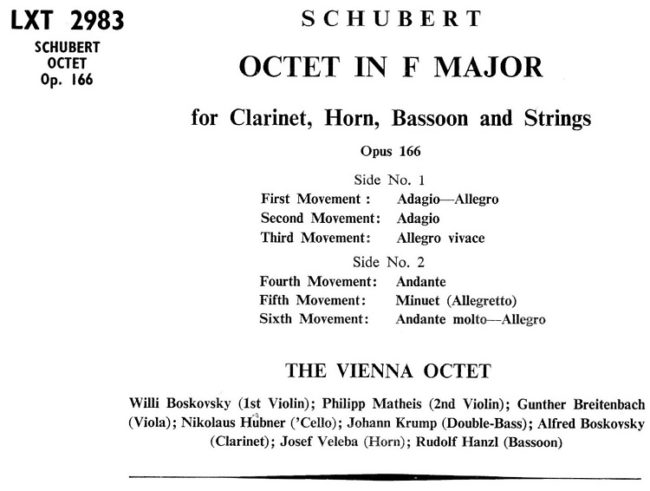
Wiener Oktett – Schubert Oktett D. 803 (1954)
Willi Boskovsky Violine I, Philipp Matheis, Violine II; Günther Breitenbach, Bratsche;
Nikolaus Hübner, Cello; Johann Krump Kontrabass;
Alfred Boskovsky, Klarinette ; Josef Veleba, Horn ; Rudolf Hanzl, Fagott
Schubert Oktett Op.166 D.803
Enregistrement /Recording: Wien Musikvereinsaal – 26 & 27 April 1954
Pr: Victor Olof; Eng: Cyril Windebank
Source 33t/LP: Decca LXT 2983
‘Wenn man Schubert gehört hat, kann einem nichts Gescheites mehr einfallen’
(Richard Strauss)
L’Octuor de Vienne (Wiener Oktett) a joué cet Octuor en public un grand nombre de fois et il l’a enregistré à plusieurs reprises.
Si on s’en tient à la formation d’origine dont Willi Boskovsky était le premier violon, on a:
1- Genève (Studio Radio) – Juillet 1948
2- Wien Musikvereinsaal – 26-27 avril 1954
3- Wien Sofiensaal – 20-29 mars 1958
L’enregistrement 78 tours de 1948 n’a pas été réédité, de même que l’enregistrement mono de 1954, au bénéfice de l’enregistrement de 1958 qui a l’avantage de la stéréo.
Au cours de l’année 1948, les musiciens du Wiener Oktett et du WPO ont eu l’occasion de se produire lors de deux concerts à Montreux en présence de deux auditeurs prestigieux, Richard Strauss et son épouse Pauline de Ahna, qui y résidaient alors.
Le premier a été donné à la Kursaal le 30 avril 1948 par le Wiener Oktett avec au programme le Septuor de Beethoven et l’Octuor de Schubert (annonce dans le ‘Journal de Montreux’ du 29 avril 1948):
 Richard Strauss était assis au premier rang d’orchestre et il a tout particulièrement apprécié l’exécution de l’Octuor de Schubert. Quand il s’est rendu dans la loge des musiciens à la fin du concert, ceux-ci lui ont demandé s’il ne pouvait pas composer une œuvre pour son ensemble. Mais Richard Strauss leur fit signe que non et leur dit alors la phrase en exergue: ‘Quand on a entendu Schubert, rien de bien valable ne peut plus venir à l’esprit’.
Richard Strauss était assis au premier rang d’orchestre et il a tout particulièrement apprécié l’exécution de l’Octuor de Schubert. Quand il s’est rendu dans la loge des musiciens à la fin du concert, ceux-ci lui ont demandé s’il ne pouvait pas composer une œuvre pour son ensemble. Mais Richard Strauss leur fit signe que non et leur dit alors la phrase en exergue: ‘Quand on a entendu Schubert, rien de bien valable ne peut plus venir à l’esprit’.
Un peu plus tard, le 5 juin, les Wiener Philharmoniker (WPO) ont, au cours d’une courte tournée en Suisse sous la direction de Furtwängler, donné un concert à Montreux, dans la Salle du Pavillon. Le programme publié à l’avance comprenait: Mozart Sérénade ‘Gran Partita’ K.361; Schubert Symphonie n° 8 ‘Inachevée’ et Beethoven Symphonie n° 3. En raison de la présence de Richard Strauss dans la salle, son ‘Don Juan’ a été joué à la place de la Symphonie de Schubert.

Dans le Journal de Montreux du 7 juin, on pouvait lire: ‘Nous avons parfois dans un concert, l’impression que l’interprétation d’un certain morceau représente l’interprétation type, idéale, de ce morceau, celle qui le réalise avec adéquation. Eh bien, Furtwängler nous a semblé donner une telle interprétation de ‘Don Juan’. Peut-être que Richard Strauss partage notre avis, lui qui assistait au concert, et que la foule enthousiaste a applaudi en même temps que Furtwängler.’
Et en effet, à la fin du concert, le compositeur alla dans sa loge pour en remercier Furtwängler*, très touché. Frau Strauss dit alors à son mari: ‘Aussi beau que ça, je ne l’ai jamais entendu de ta part’ (‘So schön habe ich das von dir noch nie gehört’). Et Strauss de répliquer: ‘Bon, mais ce n’est tout de même pas lui qui l’a composé!’ (‘Na ja, dafür hat er‘s net komponiert!’).
Fin novembre et début décembre 1947, Furtwängler et treize instrumentistes à vents du WPO ont enregistré la Gran Partita’ de Mozart. En juillet 1948, le Wiener Oktett a mis en disques l’Octuor de Schubert. On peut imaginer que ces deux enregistrements restituent des interprétations proches de ce que Richard Strauss a pu écouter en concert à Montreux. Pour l‘œuvre de Schubert, en attendant une réédition souhaitable de l’enregistrement de 1948, on peut apprécier la très belle version de 1954, fort bien captée.
* Ce ne fut pas leur seule rencontre. Le couple Strauss a résidé au Montreux Palace de septembre 1947 à mai 1949, et Furtwängler qui habitait à Clarens est parfois venu leur rendre visite en voisin.
______________________________
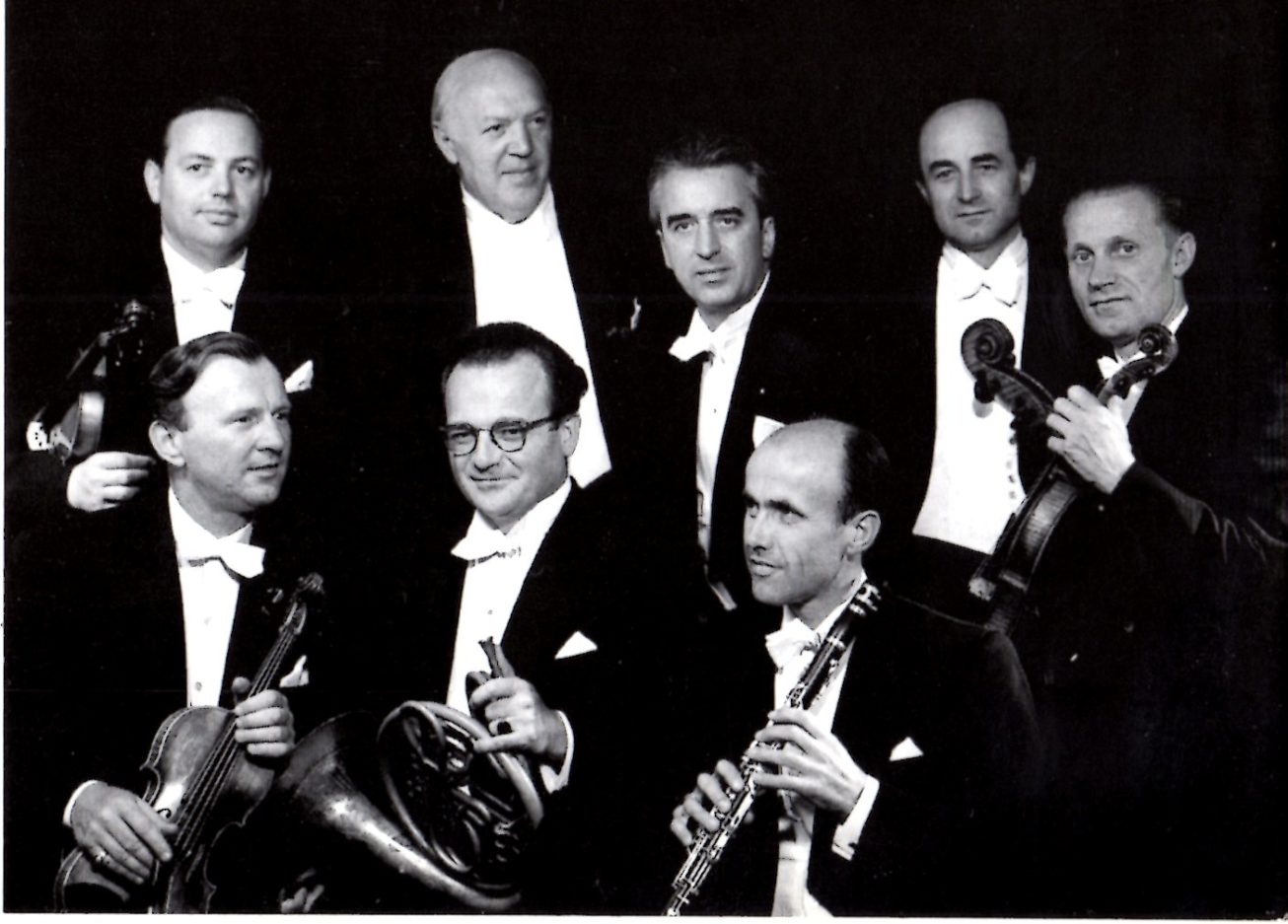
Wiener Oktett
Premier Rang /First Row: Willi Boskovsky; Josef Veleba; Alfred Boskovsky
Deuxième Rang/Second Row: Philipp Matheis; Johann Krump; Rudolf Hanzl; Nikolaus Hübner; Günther Breitenbach
______________________________
The Vienna Octet (Wiener Oktett) performed Schubert’s Octet many times and recorded it several times.
With the original members, with Willi Boskovsky as first violin, we have:
1- Geneva (Studio Radio) – July 1948
2- Wien Musikvereinsaal – 26-27 April 1954
3- Wien Sofiensaal – 20-29 March 1958
The 1948 78rpm recording has not ben re-issued, nor the 1954 mono recording, unlike the 1958 version that benefits from stereo.
In 1948, the musicians from the Wiener Oktett and from the WPO had the opportunity of playing during two concerts in Montreux before two celebrated spectators, Richard Strauss and his wife Pauline de Ahna, who were then living there.
The first was given at the Kursaal on 30 April 1948 by the Wiener Oktett and the program was Beethoven’s Septet and Schubert’s Octet (announcement in the ‘ Journal de Montreux’ of 29 April 1948):
Richard Strauss sat in the first row and he was particularly delighted by the performance of Schubert’s Octet. As he went to the musicians’ dressing-room at the end of the concert, they asked him whether he could compose a work for their ensemble. But Richard Strauss shook his head and then said the above-cited words: ‘When one has heard Schubert, nothing clever may come to the mind any more’.
Somewhat later, on 5 June, the Wiener Philharmoniker (WPO), during a short Swiss tour conducted by Furtwängler, gave a concert in Montreux, in the ‘Salle du Pavillon’. The program that was published in advance was comprised of: Mozart Serenade ‘Gran Partita’ K.361; Schubert’s Symphony n° 8 ‘Unfinished’ and Beethoven’s Symphony n° 3. Because Richard Strauss attended the concert, his ‘Don Juan’ was performed instead of Schubert’s Symphony.

In the 7 June edition of the ‘Journal de Montreux’, one read: ‘ In a concert, we have sometimes the impression that the interpretation of a given piece represents the reference, the ideal interpretation of that piece, that is the adequate rendering. Well, Furtwängler seemed to us to have given such an interpretation of ‘Don Juan’. Perhaps Richard Strauss shares our view, he who attended the concert, and who was applauded by the enthusiastic crowd, at the same time as Furtwängler.’
And indeed, at the end of the concert, the composer went to his dressing-room to thank for it Furtwängler*, very moved. Frau Strauss then said to her husband: ‘As beautiful as this, I have never heard from you’ (‘So schön habe ich das von dir noch nie gehört’). Then came Strauss’ reply: ‘Well, however, he is not the one who composed it!’ (‘Na ja, dafür hat er‘s net komponiert!’).
At the end of November and the beginning of December 1947, Furtwängler and thirteen wind players from the WPO recorded the ‘Gran Partita’ by Mozart. In July 1948, the Wiener Oktett committed to disc Schubert’s Octet. One may imagine that these two recordings reproduce interpretations close to what Richard Strauss heard live in Montreux. For the Schubert work, while awaiting a desirable re-issue of the 1948 recording, one may appreciate the very good 1954 version, very well recorded.
* This was not the only time that they met. Strauss and his wife lived at the ‘Montreux Palace’ from September 1947 to May 1949, and Furtwängler who lived in Clarens came sometimes as a neighbour to pay them a visit.
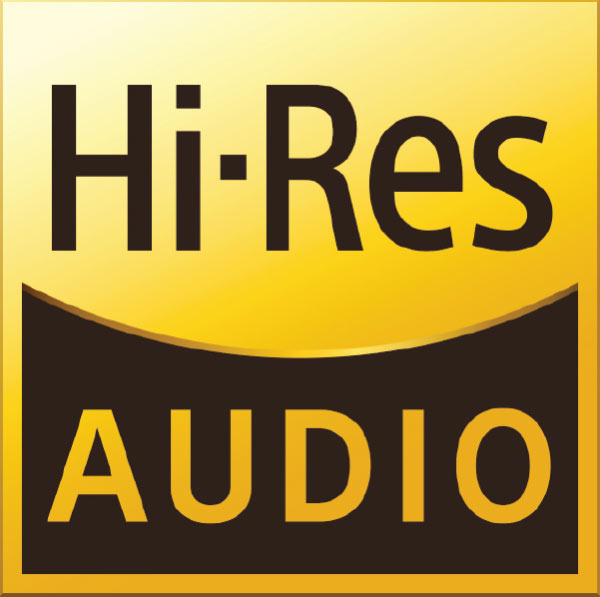
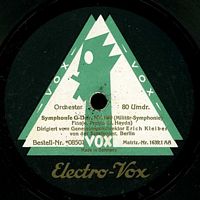
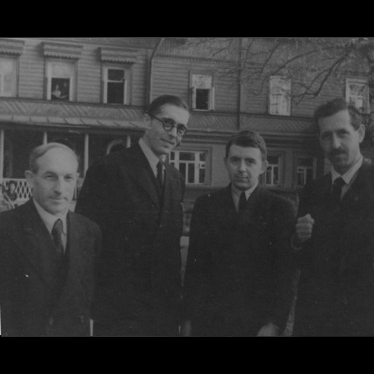
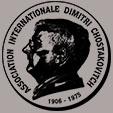
9 réponses sur « Wiener Oktett – Schubert Oktett D. 803 (1954) »
HD/Hi-Res (24 bits/88 KHz):
https://e.pcloud.link/publink/show?code=kZcg8QZWFzwnYCi5LL2m2Di1NmTAj5eusmy
Format CD (16 bits/44 KHz):
https://e.pcloud.link/publink/show?code=kZog8QZRNteyQhh7fVteD4JCAyt1S6U7rdX
Very nice, thank you!
Thats great recording 🙂 thank You.
Thank you for sharing this wonderful recording. 🙂
Meanwhile, the earliest, 1948 recording had been reissued on CD as part of a 50-CD « Willi Boskovsky: Complete Decca Recordings » set. If one looks for it on Amazon, it’s only available from a third-party seller at a highly exorbitant price of about 800 USD:
https://www.amazon.com/Willi-Boskovsky-Complete-Decca-Recordings/dp/B07JK2FL1G
Well seen!
It is a pity it was not re-issued separately with other early recordings (e.g. the Beethoven Septet from 1948)!
However much we may dislike the remastering of Australian Eloquence, they may possibly be the best hope for a reissue of all of the Wiener Oktett’s recordings on CD. They have produced a box set of the Netherlands Wind Ensemble’s recordings and surely they can churn out a box set featuring the Wiener Oktett, assuredly one of the greatest chamber ensembles in the history of Classical Music recordings.
In the past, Decca produced very good remasterings. Why they don’t now is ununderstandable.
Here’s a latest news from Decca/Eloquence that I’ve just received from their email newsletter: a box set featuring the recordings of the Vienna Octet (i.e. Wiener Oktett), New Vienna Octet and Vienna Wind Soloists is now on the schedule for release in 2023. How the transfer is done is something that we will have to wait and hear.
Thanks!
Let’s hope that, for the older recordings at least, they will use already made transfers without any further processings.